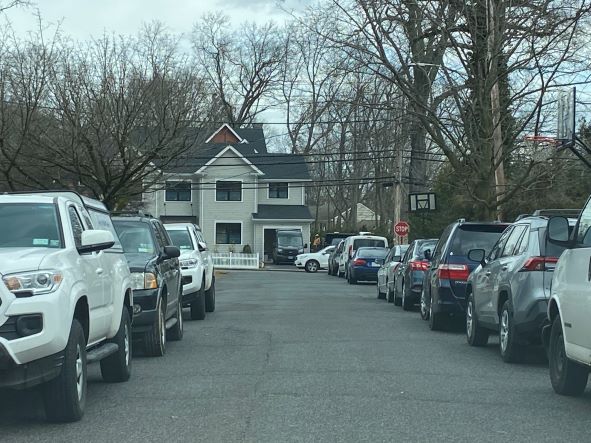Crew parking on Griffon Place
BY TOM MCDERMOTT
At its February 16 meeting, the City Council adopted three revisions to the City’s laws related to development after an exhaustive, months-long review under concerted pressure from residents, especially those who live near the flag lot development at 95-97 Oakland Beach Avenue.
The first law to be amended was Chapter 197 “Zoning”, which sets new restrictions on lot width and configurations of properties in new subdivisions. The Council determined that there was a need to amend the code to address concerns related to flag lot lines that result in lot configurations inconsistent with established community character.
For zones R1-R6, the minimum required rear yard setback for the district in which the lot is located shall be narrower in width than 75 feet.
The second law, Chapter 166 “Steep Slope Protection”, establishes higher penalties for violators and does a better job of regulating development on steep slopes.
After considerable wrangling over language in Chapter 53 “Architectural Review”, the Council voted to change the standard from “beyond a reasonable doubt” to “clear and convincing evidence” to give the BAR greater authority in the building application process to protect neighbors and neighborhoods. This was the only one of the three new laws that didn’t pass unanimously. Councilman Ben Stacks thought the amendment needed more teeth.
Over a year ago, the flag lot and steep slope project at 95-97 Oakland Beach Avenue galvanized the immediate neighbors and ones throughout Hix Park. They objected to months of rock-blasting that caused cracks in homes, and the arbitrary removal of some 100 trees by the developer right after he purchased the property. They raised concerns about increased water runoff and the inappropriate size and height of the two homes replacing the previous home.
By May 5, the Council and the Mayor, who had visited the site at the behest of residents, established a six-month moratorium suspending all processing of subdivision applications. That was followed by the establishment of a Zoning Revisions Committee, led by Councilwoman Carolina Johnson, which also included Richard Mecca, City Planner Christian Miller, Planning Commission Chair Nick Everett, Conservation Commission/Advisory Council Chair Tracy Stora, and BAR Chair Michael Harrington. As the Committee and the Council deliberated, the moratorium was extended twice, to March 31, 2022.
After the vote, Johnson praised the Committee, especially Miller and Everett, for explaining complicated, often confusing rules and formulas to the Council. She noted that the Committee reviewed similar zoning laws in surrounding towns. “Westchester’s steep slope model became New York State’s model,” said Johnson. “We tailored the revision to reflect Rye’s needs.” Johnson emphasized that the flooding on September 1 from Ida further demonstrated that Rye had to deal with steep slope development.
“BAR was only able to deny a handful of applications over a number of years,” commented Johnson. “People got what they wanted nearly every time.”
After the Council debated the language of the revisions at its February 2 meeting, attorney Jonathan Kraut called in to address the Council regarding what he termed a “misguided” approach to the proposed changes in the BAR review process. “You should seek to avoid the subjective way the BAR operates. You should require that a registered architect be included. Otherwise, it’s just an opinion.”
Asked if she was satisfied with the changes in the laws, Oakland Beach Avenue resident and Board of Architectural Review member Kathy Hobbins, who voiced concerns about the project early on, told the paper, “Yes, we are satisfied by the revisions, but as a first step; there may be more changes needed down the road.”
Ken Knowles, longtime Fullerton Place resident, felt pressure from the neighborhood had an effect on the Council’s actions. “We made a fair amount of noise, but to me, it’s a sad story. People still don’t grasp the gravity of how much oversized building is going on around town.”
Mayor Cohn agreed that residents, particularly ones who live near the Oakland Beach Avenue project, “played an important role in underscoring the need for reexamination of our laws. Of course, the Oakland Beach neighbors desired the protection of law, not to be the agents of later change in law. The recent law changes and changes that may follow will do little to diminish their frustration, a frustration that was shared by many on the Council.”















